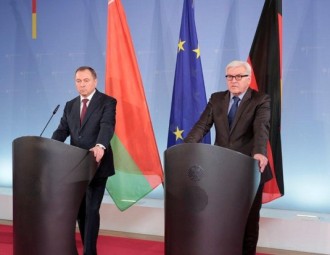Belarus Foreign Ministry expects that all sanctions are lifted
 photo by press service of the Federal Foreign Office
photo by press service of the Federal Foreign Office
The Minister of Foreign Affairs of the Republic of Belarus Uladzimir Makei met with the Federal Minister for Foreign Affairs of Germany Dr. Frank-Walter Steinmeier.
It was the first time in many years that a Belarusian Foreign Minister visited the Federal Foreign Office in Berlin. Foreign Minister Steinmeier also saw a joint press conference with his Belarusian counterpart Uladzimir Makei as an important signal. He spoke of the “real possibility of relations between Belarus and the West gradually moving closer together”. Germany and the EU had given Belarus “a gesture of good faith” by suspending sanctions, he added. Steinmeier emphasised that it was in the “joint interest” of Belarus and Europe to further “normalise relations”.
“This meeting this morning has also been possible because there has been a shift in Belarus,” the press service of the Federal Foreign Office quotes him saying.
For Steinmeier, this shift found “significant expression” in the release of political prisoners in Belarus. Unlike in 2010, the presidential elections were also conducted peacefully even if they did not meet European standards in all respects.
After the meeting with his German counterpart, Uladzimir Makei made a statement, claiming that Belarus can count on complete lift of EU sanctions.
Alongside the extension of bilateral relations, Steinmeier and Makei also discussed participation of the Republic of Belarus in the process of Eurasian integration, Belarus-Germany cooperation in the framework of international organizations, the conflict in eastern Ukraine and progress on implementing the Minsk agreements, the Syria conflict, and a number of other current international issues in politics.
As the press service of the Belarus Foreign Ministry informs, apart from the press-conference with the German Foreign Minister, Uladzimir Makei also held meetings with Foreign and Security Policy Advisor to the Federal Chancellor Dr. Christoph Heusgen, Chairman of the German-Belarusian Parliamentary Group of the Bundestag Oliver Kaczmarek and members of this group, representatives of the German expert community.
-
03.01
-
07.10
-
22.09
-
17.08
-
12.08
-
30.09








































